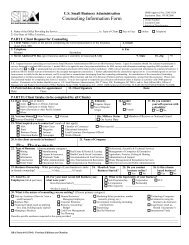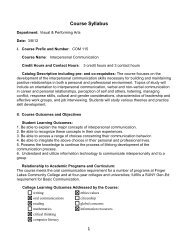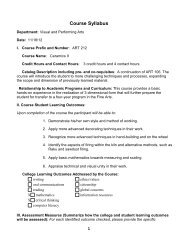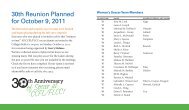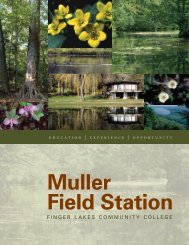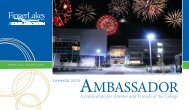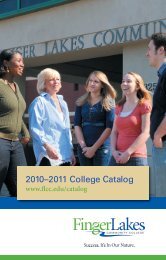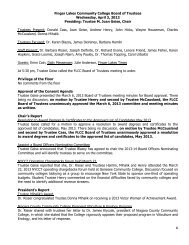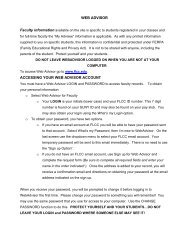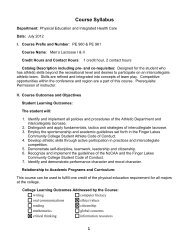Nursing Department Policies and Standards - Finger Lakes ...
Nursing Department Policies and Standards - Finger Lakes ...
Nursing Department Policies and Standards - Finger Lakes ...
Create successful ePaper yourself
Turn your PDF publications into a flip-book with our unique Google optimized e-Paper software.
A. Academic <strong>Policies</strong> <strong>and</strong> St<strong>and</strong>ards<br />
FINGER LAKES COMMUNITY COLLEGE<br />
<strong>Department</strong> of <strong>Nursing</strong><br />
NURSING DEPARTMENT POLICIES AND STANDARDS*<br />
1. General Grading……………………………………………………….. Page 1<br />
2. Math Testing…………………………………………………………… Page 2<br />
3. Skill Competencies …………………………………………………… Page 3<br />
4. <strong>Nursing</strong> Care Plans…………………………………………………… Page 4<br />
5. Clinical Facility Requirements……………………………………….. Page 4<br />
6. Clinical Performance…………………………………………………. Page 4<br />
7. Clinical Probation …………………………………………………….. Page 5<br />
8. Curriculum Requirements …………………………………………… Page 5<br />
9. Contesting Placement on Clinical Probation or Failure ………….. Page 6<br />
10. Attendance ……………………………………………………………. Page 6<br />
11. Hearing Guidelines…………………………………………………… Page 7<br />
12. Program Continuity ………………………………………………….. Page 8<br />
13. Exit Interview …………………………………………………………. Page 8<br />
14. Confidentiality/HIPAA Guidelines ……………………………………. Page 8<br />
15. Other Clinical Guidelines ……………………………………………. Page 8<br />
16. Other Guidelines …………………………………………………..…. Page 8<br />
B. Dress Code ……………………………………………………………….. Page 9<br />
C. Admission <strong>Policies</strong><br />
1. General Admission Requirements………………………………….. Page 10<br />
2. Transfer-In <strong>Policies</strong> ………………………………………………….. Page 11<br />
3. Advanced Placement ……………………………………………….. Page 11<br />
4. Readmission to the <strong>Nursing</strong> Program …………………………….. Page 12<br />
5. Student Registration ………………………………………………… Page 13<br />
D. <strong>Nursing</strong> 203/204 Summer Session Criteria …………………………… Page 13<br />
E. <strong>Nursing</strong> Practicums ………………………………………………………. Page 14<br />
F. Expected Qualities for Success…………………………………………. Page 14<br />
G. St<strong>and</strong>ards Relative to RN Licensure ………………………………….. Page 15<br />
H. A.N.A. Code of Ethics for Nurses .……………………………………… Page 16<br />
May, 2013<br />
*<strong>Policies</strong> <strong>and</strong> st<strong>and</strong>ards are subject to review <strong>and</strong> change at the recommendation of the<br />
<strong>Department</strong>al Academic St<strong>and</strong>ards <strong>and</strong> <strong>Policies</strong> Committee <strong>and</strong> approval of the <strong>Nursing</strong><br />
<strong>Department</strong>. After <strong>Nursing</strong> <strong>Department</strong> approval, all changes will be communicated to current<br />
students via the Angel Learning Platform <strong>and</strong> updated on the FLCC web site.
ACADEMIC POLICIES AND STANDARDS<br />
1. General Grading:<br />
- 1 -<br />
a. Each student is required to maintain a minimum grade of ‘C+’ (2.3) in Fundamentals of<br />
<strong>Nursing</strong> <strong>and</strong> a grade of ‘C’ (2.0) in subsequent nursing courses in order to proceed to the next<br />
nursing course.<br />
Grading System:<br />
A - 90 C- - 67-69<br />
B+ - 86-89 D+ - 64-66<br />
B - 82-85 D - 61-63<br />
B- - 78-81 D- - 58-60<br />
C+ - 74-77 F - 57 <strong>and</strong> below<br />
C - 70-73<br />
Final course grades are rounded to the nearest whole number.<br />
b. In terms of grading, clinical performance takes precedence over academic achievement.<br />
<strong>Nursing</strong> clinical grading is based on ‘S’ (Satisfactory) or ‘U’ (Unsatisfactory) performance.<br />
Passing will be either ‘Satisfactory’ or ‘Probation’ status. ‘Failure’ is defined as unsatisfactory<br />
performance at any point during a nursing course.<br />
A student who is deemed a clinical failure prior to the established college withdrawal date for<br />
that semester has the option to withdraw from the course. Should the clinical failure occur after<br />
the established college withdrawal date, the student will receive an “F” for the course<br />
regardless of the theory grade earned.<br />
c. Academic Dishonesty: Per the FLCC Student Code of Conduct Policy:<br />
Engaging in forms of dishonesty, such as cheating <strong>and</strong> plagiarism is prohibited. The term<br />
‘cheating’ includes but is not limited to: 1) use of any unauthorized assistance in taking<br />
quizzes, tests, or examinations; 2) dependence upon the aid of sources beyond those<br />
authorized by the instructor in writing papers, preparing reports, solving problems, or carrying<br />
out other assignments; or 3) the acquisition, without permission, of tests or other academic<br />
material belonging to a member of the College faculty of staff. The term ‘plagiarism’ includes,<br />
but is not limited to the use by paraphrase or direct quotation of the published or unpublished<br />
work of another person without full <strong>and</strong> clear acknowledgment. It also includes the<br />
unacknowledged use of materials prepared by another person or agency engaged in the<br />
selling of term papers or other academic materials.<br />
Any evidence of dishonesty on the part of a student or aiding (defined by Webster’s dictionary<br />
as “to render assistance or help”) or abetting (defined by Webster’s dictionary as “to<br />
encourage <strong>and</strong> support especially a wrongdoing or wrongdoer”) on the part of another student<br />
in the clinical or academic area will result in a departmental hearing for consideration of<br />
dismissal from the nursing program. Additionally, any student found to have had knowledge of<br />
actual or potential dishonesty <strong>and</strong> who fails to report it will be required to attend a<br />
departmental hearing for consideration of dismissal from the program.<br />
Any exam material disclosure by students including the nature or content of examination<br />
items, before, during, or after the examination is prohibited <strong>and</strong> is considered academic<br />
dishonesty.<br />
Electronic Devices/Social Media<br />
a. Audio tape recording of lecture is acceptable. Reproduction <strong>and</strong>/or distribution of<br />
recorded lecture via social media e.g. facebook, youtube is prohibited.<br />
b. All media/communication devices other than audio tape recording devices, e.g. cameras,<br />
video players, etc. are prohibited during class <strong>and</strong> scheduled lab sessions.
- 2 -<br />
c. Cell phones are to be powered off during class <strong>and</strong> scheduled lab sessions.<br />
d. Cell phone use for students is permitted during assigned break/lunch periods outside of<br />
patient care areas while in the clinical area. Cell phones are to be powered off during all<br />
interactions with faculty i.e. pre <strong>and</strong> post conferences while in the clinical setting unless<br />
instructed by the faculty member.<br />
e. Students will follow the assigned clinical facility’s policy regarding use of electronic devices<br />
while in the clinical area.<br />
d. Clinical Assignments:<br />
It is expected that clinical assignments must be h<strong>and</strong>ed in/completed by the designated date.<br />
Late clinical assignments with a point value grade will be penalized per requirements as<br />
noted in course syllabi. Late clinical assignments with an ‘S/U’ grading scale may be<br />
accepted at the discretion of the clinical instructor.<br />
a. Exam computer answer sheets will be collected after students have seen their grades.<br />
b. Use of calculators during class testing will be permitted. The only calculator to be used during<br />
class testing is the make/model listed in the course syllabus. No sharing of calculators is<br />
permitted. Calculators are subject to inspection by <strong>Nursing</strong> faculty at any time.<br />
2. Math Testing:<br />
a. Students must achieve the minimum score on Math of Medications tests for NUR 100, 101, &<br />
202 in order to obtain a ‘Satisfactory’ clinical grade. Minimum score requirement is 90% in<br />
NUR 100 & 101 <strong>and</strong> 100% in NUR 202.<br />
b. Any student who will not be present for a Math test must notify the <strong>Nursing</strong> <strong>Department</strong> prior<br />
to the exam time. Failure to adhere to this policy will result in forfeiture of that attempt. If the<br />
student calls the department appropriately, s/he will take the next scheduled math test<br />
without forfeiting an attempt.<br />
c. Three testings are allowed. A student who fails the third Math test in any one semester may<br />
qualify for a fourth <strong>and</strong> final testing provided the student meets the following criteria:<br />
(1) The student has not required a fourth Math testing during his/her enrollment in the<br />
<strong>Nursing</strong> Program.<br />
(2) The student’s academic average, verified at the time of the failed math test, is:<br />
(a) NUR 100 – 74% or better<br />
(b) NUR 101 <strong>and</strong> 202 – 70% or better.<br />
(3) The student’s clinical performance is satisfactory.<br />
(4) The student must either successfully take <strong>and</strong> pass DST 141 (Basic Math Concepts for<br />
Nurses) or provide the <strong>Nursing</strong> <strong>Department</strong> with documentation that s/he has obtained<br />
professional tutoring in math with a member of either the Mathematics <strong>Department</strong> or<br />
Academic Support Center.<br />
d. A grade of “F” for the course will be given to any student who is unsuccessful on a third math<br />
test <strong>and</strong> does not meet all of the criteria listed above for additional testing<br />
e. Successful completion of the fourth math test must be done before the student will be allowed<br />
to progress to the next nursing course. The student will receive a grade of incomplete (I) in<br />
the course in which a fourth test is needed <strong>and</strong> take the test as scheduled by the nursing<br />
faculty pending satisfactory academic completion of the course.
- 3 -<br />
f. Should the student not pass the theory component of the nursing course, s/he will receive the<br />
theory grade earned. Therefore, the student will not be required to take the fourth math test<br />
<strong>and</strong> the student will be noted as not having successfully completed the course.<br />
g. Any student who is unsuccessful on the fourth Math test will receive a grade of “U” in clinical<br />
<strong>and</strong> therefore a grade of “F” in the course.<br />
3. Skill Competencies:<br />
a. Skill competency testing is considered an integral part of clinical evaluation. Failure to pass a<br />
skill competency within the allotted number of testings constitutes clinical failure.<br />
b. If a student fails to appear for a scheduled competency without prior notification to the<br />
designated instructor, the student will forfeit that attempt.<br />
Notification is to made in the following fashion:<br />
if testing is scheduled with a full-time faculty member, via instructor FLCC phone number<br />
if testing is scheduled with an adjunct faculty member, via FLCC <strong>Nursing</strong> secretary at<br />
585-785-1345<br />
if testing is scheduled on a Saturday, via 585-785-1429<br />
c. NUR 100 & 101 – Students must verify practice before attempting competencies by obtaining<br />
signatures from collaborative group member(s).<br />
d. NUR 202 – Supervised practice with an instructor is recommended before a student attempts<br />
competencies. Supervised practice is to be done in groups, not individually.<br />
e. Students may be tested by their clinical instructor or any other instructor of the same course<br />
who has available lab time. No one may observe a testing situation other than the instructor.<br />
f. NUR 100 – Students may be tested three times for each competency prior to the specified<br />
deadline.<br />
g. NUR 101 & 202 – Students may be tested twice for each competency prior to the specified<br />
deadline.<br />
h. Exit Medication Competencies – Students not graduating immediately following <strong>Nursing</strong> 202<br />
will be expected to pass the Exit Medication Competencies prior to the identified deadline<br />
date. All forms of medication administration previously taught may be tested. Students may<br />
be tested only twice for each competency.<br />
i. When comp testing dates are assigned by lottery <strong>and</strong> a student fails to test during his/her<br />
assigned time frame, the student will forfeit his/her first attempt<br />
j. If the student has failed a competency <strong>and</strong> does not meet all of the criteria listed below for<br />
additional testing s/he may request in writing a hearing with the course faculty to appeal the<br />
resulting clinical failure. If the student has requested a hearing, class <strong>and</strong> clinical participation<br />
may continue pending the hearing outcome.<br />
Criteria for Additional Testing:<br />
In the event that any competency is not passed, one additional testing will automatically be<br />
granted if the student meets the following criteria:<br />
(1) The student has attempted the competency at least once prior to the specified<br />
deadline.<br />
(2) The student’s academic average, verified at the time of the failed competency, is:<br />
a) NUR 100 – 74% or better
- 4 -<br />
b) NUR 101, 202, 203 <strong>and</strong> 204 – 70% or better.<br />
(3) The student’s clinical performance is satisfactory.<br />
(4) In addition, the student has not required additional testing for any other competency<br />
during the semester.<br />
The additional testing must be attempted within one week of the original competency due date<br />
<strong>and</strong> time or it will be forfeited.<br />
4. <strong>Nursing</strong> Care Plans:<br />
a. Definite time limits are set on these assignments <strong>and</strong> vary from course to course. The care<br />
plan must be in on the date due. Late care plans are not acceptable without special<br />
permission of the instructor. If the instructor is not available, all care plans must be initialed<br />
<strong>and</strong> dated by the secretary (or any available faculty member) when submitted.<br />
b. The number of care plans required in each course is specified in the course outline.<br />
c. Care plans may be revised twice at the discretion of the instructor to achieve a satisfactory<br />
grade.<br />
d. Failure to meet care plan requirements may result in either clinical probation or clinical failure<br />
depending on the student’s overall clinical performance.<br />
5. Clinical Facility Requirements<br />
a. Students are responsible for their own transportation to affiliating clinical sites.<br />
b. Students are required to comply with all the policies of the healthcare facility to which they<br />
are assigned.<br />
c. Students who are unable to comply with the policies of the healthcare facility of an assigned<br />
healthcare facility <strong>and</strong> for whom alternate accommodations cannot be secured, will be<br />
ineligible for <strong>Nursing</strong> Program completion. For example, if a clinical facility requires a<br />
background check <strong>and</strong> the student fails to meet the facility’s requirement, the student may be<br />
ineligible for <strong>Nursing</strong> Program completion.<br />
d. As a nursing student, you may be required to provide a criminal background report <strong>and</strong>/or<br />
drug screening at your own expense if required by the clinical agency to which you are<br />
assigned.<br />
6. Clinical Performance:<br />
a. Each student will be prepared for every clinical experience, i.e. completed mini care plan per<br />
course syllabus, ability to address specifics about patient’s labs <strong>and</strong> medications, proper<br />
clinical attire <strong>and</strong> presentation per dress code. Unpreparedness may result in student being<br />
dismissed from clinical for the day. Any missed hours will be counted as clinical absence<br />
time.<br />
b. Student nurses are to subscribe to the same laws as health facility employees which state:<br />
“No person is employed unless he/she is free from a health impairment which is a potential<br />
risk to the patients or which might interfere with the employee’s performance of his/her duties,<br />
including habituation or addiction to depressants, stimulants, narcotics, alcohol or other<br />
substances that may alter behavior.”
- 5 -<br />
c. At any time during a course when deemed by a clinical instructor that a student has<br />
jeopardized/will jeopardize patient safety (physical <strong>and</strong>/or psychological), the instructor<br />
reserves the right to prohibit the student from continuing the clinical experience.<br />
d. Once students have been determined a clinical failure r/t patient safety issues (physical<br />
<strong>and</strong>/or psychological), they will not be allowed to attend clinical/lab or take any tests. Class<br />
attendance may continue.<br />
e. Any change in health status (i.e. surgery, hospitalization, pregnancy, birth, etc.) after<br />
admission to the program requires written health care provider clearance to return to<br />
class/clinical.<br />
7. Clinical Probation:<br />
a. Clinical probation identifies the student who has the potential to correct deficiencies <strong>and</strong><br />
reach an acceptable level of performance. Examples of reasons for putting a student on<br />
probation: Unsatisfactory paperwork; tardiness; problems with organizational skills; lack of<br />
professional behavior; interpersonal problems with peers, hospital staff <strong>and</strong>/or patients;<br />
problems with asepsis; lack of satisfactory performance of clinical skills; <strong>and</strong>/or any items on<br />
the clinical contract.<br />
b. A student may be retained on clinical probation only once while in the nursing program,<br />
regardless of the length of time involved. A student may be placed on probation at midsemester,<br />
at the end of the semester, or whenever deemed appropriate. A student who is<br />
placed on probation at or before mid-semester must be removed by the end of the semester.<br />
A student who is placed on probation after mid-semester <strong>and</strong> is taking NUR 100 or NUR 101<br />
cannot be removed before the middle of the next semester but must be removed by the end<br />
of that semester. A student who is placed on probation after mid-semester <strong>and</strong> is taking NUR<br />
202, NUR 203, or NUR 204 must be removed by the end of the semester. Students placed<br />
on clinical probation will receive a copy of their probationary statement. Another copy is to<br />
remain in their advisement folder. Students on clinical probation must periodically seek out<br />
the clinical instructor for feedback regarding progress toward meeting identified deficiencies.<br />
c. Any student on probation at the end of NUR 101 will not be allowed to enroll in Summer NUR<br />
203 <strong>and</strong>/or NUR 204.<br />
8. Curriculum Requirements:<br />
The student is required to complete a minimum of 67 semester hours with a grade point average<br />
of not less than ‘C’ (2.0) <strong>and</strong> a minimum grade of ‘C’ in all curriculum required courses. A<br />
cumulative grade point average of ‘C’ (2.0) or better <strong>and</strong> a minimum of ‘C’ in Anatomy <strong>and</strong><br />
Physiology I & II are required to continue in the <strong>Nursing</strong> program. In addition, satisfactory grade<br />
performance in the <strong>Nursing</strong> program includes a minimum of ‘C+’ (2.3) in NUR 100 Fundamentals<br />
of <strong>Nursing</strong> <strong>and</strong> ‘C’ (2.0) in each succeeding required <strong>Nursing</strong> course. Unsatisfactory clinical<br />
performance in <strong>Nursing</strong> negates academic grade performance. Dismissal will occur if these<br />
curriculum requirements are not met.<br />
A student enrolled in NUR 215 who withdraws from or is deemed a clinical failure in NUR 202,<br />
203, or 204 <strong>and</strong> who wishes to continue in NUR 215 must submit a written request to the <strong>Nursing</strong><br />
<strong>Department</strong> chair. The written request must include a detailed rationale for continuation in NUR<br />
215 <strong>and</strong> be submitted within one week of the withdrawal or failure. The student may continue in<br />
NUR 215 until the department decision has been finalized.<br />
If a grade below ‘C’ is achieved in any other curriculum required course, the student must repeat<br />
the requirement but can remain in the nursing program. Each c<strong>and</strong>idate for graduation must first<br />
be approved as having successfully completed program requirements.<br />
Students who are a clinical failure <strong>and</strong> are enrolled in an elective NUR course may continue in the<br />
course with permission of the instructor.
- 6 -<br />
9. Contesting Placement on Clinical Probation or Failure:<br />
If a student wishes to contest placement on clinical probation or a clinical failure at any time<br />
during the semester, s/he may do so using the following steps, each of which has a time limit<br />
associated with it. The chain of comm<strong>and</strong> must be followed:<br />
10. Attendance:<br />
Step 1 – Within three business days of the notification of clinical probation or failure, the<br />
student must request a conference with the faculty placing him/her on clinical probation or<br />
giving him/her a clinical failure to express his/her grievance.<br />
Step 2 - If the issue was not resolved in step 1 (the student-faculty conference), the student<br />
has three business days following the date of the conference to request a conference with the<br />
lead teacher of the course in which clinical probation or failure has been assigned.<br />
Step 3 - If the issue remains unresolved after step 2 (the student-lead teacher conference),<br />
the student has three business days following notification of the Step 2 decision to submit a<br />
written request to the course lead teacher for a hearing with the level faculty.<br />
Step 4 - If the issue remains unresolved after Step 3 (the course level hearing), the student<br />
has three business days following notification of the Step 3 decision to submit a written<br />
request to the <strong>Department</strong> Chair for a hearing with the full <strong>Nursing</strong> <strong>Department</strong> to state<br />
his/her grievance.<br />
The <strong>Department</strong> Chairperson will contact the student with the decision of the <strong>Nursing</strong><br />
<strong>Department</strong> after the <strong>Department</strong> hearing within a reasonable time frame, normally within<br />
twenty-four hours.<br />
Step 5 - If the student wishes to contest the decision of the <strong>Department</strong> hearing, s/he must<br />
follow the FLCC grievance policy.<br />
a. Regular attendance in lecture is strongly recommended <strong>and</strong> encouraged.<br />
b. College lab <strong>and</strong> clinical attendance is m<strong>and</strong>atory. In the case of an emergency which<br />
necessitates an absence, the student must confer with his/her clinical instructor who will<br />
determine whether a level hearing is needed. An alternate activity may be planned according<br />
to the course outcomes.<br />
(1) Late arrival to college lab <strong>and</strong>/or clinical is unacceptable <strong>and</strong> may be considered an<br />
absence at the discretion of the instructor.<br />
(2) Prior to an absence from clinical the student will contact his/her clinical instructor by<br />
telephone per specific instructions which are provided during clinical orientation by<br />
his/her clinical instructor. Notification by any other means, i.e. email, text, facebook or<br />
other social media, or FLCC voice mail, is not acceptable. If the student is unable to<br />
contact the instructor, s/he is to call the facility to which s/he is assigned <strong>and</strong> ask the<br />
hospital personnel to relay the message to the clinical instructor.<br />
(3) a) A student absent for more than 10% of his/her clinical hours in NUR 100 (6 hours or<br />
more), NUR 101 (10 hours or more) or NUR 202 (14 hours or more), has completed all<br />
clinical assignments satisfactorily <strong>and</strong> has passed the theory component of the nursing<br />
course will earn an incomplete grade for the course. In order to successfully complete the<br />
course in which the incomplete was earned due to absenteeism, the student will be<br />
required to take <strong>and</strong> successfully complete NUR 211, a one credit clinical make up<br />
practicum. This course is intended to afford students the opportunity to gain clinical
- 7 -<br />
experience that was missed during the regular semester. This course is NOT a<br />
remediation for clinical deficiencies or clinical probation.<br />
b) A student absent for more than 10% of his/her clinical hours in NUR 100 (6 hours or<br />
more), NUR 101 (10 hours or more) or NUR 202 (14 hours or more), who is in good<br />
clinical st<strong>and</strong>ing but has NOT passed the theory component of the <strong>Nursing</strong> course will<br />
receive the theory grade earned, therefore will not have successfully completed the<br />
course.<br />
c) Note: Missed clinical hours are not made up on an hour per hour basis. The practicum<br />
must be successfully completed in order to fulfill the course requirements.<br />
(4) Snow Day Policy:<br />
Clinical is canceled if any of the following are closed due to unsafe driving conditions:<br />
a) FLCC<br />
b) the clinical facility’s school district<br />
If the student’s school district is closed due to unsafe driving conditions, the student is not<br />
obligated to attend clinical. It is expected that the student will exercise prudent judgment<br />
in making this decision.<br />
(5) Prior to an absence from college lab, the student will contact by telephone the <strong>Nursing</strong><br />
Technical Specialist.<br />
c. Excessive college lab <strong>and</strong>/or clinical tardiness <strong>and</strong>/or absences may result in a clinical<br />
probation or failure.<br />
d. Absence/Lateness to class on testing dates:<br />
(1) Any student who will not be present at the beginning of a test must notify the course lead<br />
teacher via the FLCC phone number prior to the exam time.<br />
Failure to adhere to this policy will necessitate the student’s appearance at a level faculty<br />
hearing to explain his/her absence <strong>and</strong> lack of notification. If his/her explanation is<br />
unacceptable to the faculty, the student will receive a grade of zero for that examination.<br />
(2) Students are expected to take a missed test on the first day they return to main campus.<br />
(3) Any student arriving 5 or more minutes after an exam has begun will be required to take<br />
the exam immediately after class.<br />
(4) Make-up exams may have an alternate format with content comparable to the original<br />
exam.<br />
(5) If two (2) absences occur on test days, the student must confer with the course lead<br />
teacher who will determine whether or not a level faculty hearing is needed.<br />
11. Hearing Guidelines<br />
a. A faculty or student who requests a hearing must do so in writing. The written request must<br />
include the basis/explanation for the hearing.<br />
b. It is the expectation that the student for whom the hearing is held will attend the hearing.<br />
c. If the student is unable to attend the hearing it will be held in absentia.<br />
d. The student may bring no personal belongings into the hearing room other than paper <strong>and</strong> writing<br />
instrument. The student is responsible for securing his/her personal belongings.
- 8 -<br />
e. The student’s role in a hearing is to present in a succinct manner only pertinent information<br />
related to the issue.<br />
f. Refer to Appendix A, <strong>Department</strong> Hearing Guidelines.<br />
12. Program Continuity:<br />
<strong>Nursing</strong> subjects should be taken sequentially over a consecutive two-year period. If this<br />
sequence pattern of nursing course study is interrupted; the faculty reserves the right to determine<br />
if the student’s knowledge <strong>and</strong> skills are current. Testing of theory <strong>and</strong> skill competency as well<br />
as course auditing may be stipulated.<br />
13. Exit Interview:<br />
Every student leaving the program for any reason is expected to schedule an exit interview with<br />
the <strong>Department</strong> Chairperson or designee.<br />
14. Confidentiality/Health Insurance Portability <strong>and</strong> Accountability (HIPAA) Guidelines:<br />
1. Students are held accountable to maintain patient confidentiality at all times <strong>and</strong> in all<br />
places.<br />
2. Any statement, including but not limited to one on a social networking site, which may<br />
cause harm or injury to another or to the school will be grounds for dismissal.<br />
3. Electronic Devices/Social Media Networking Sites<br />
a.Audio tape recording of lecture is acceptable. Reproduction <strong>and</strong>/or distribution of<br />
recorded lecture via social media eg facebook, youtube is prohibited.<br />
b.All media/communication devices other than audio tape recording devices, eg cameras,<br />
video players, etc. are prohibited during class <strong>and</strong> scheduled lab sessions ie: Lab,<br />
collaborative group, seminar <strong>and</strong> faculty demonstrations.<br />
c. No photos or videos of faculty or staff without written permission.<br />
d.Cell phones are to be powered off during class <strong>and</strong> scheduled lab sessions.<br />
e.Cell phone use for students is permitted during assigned break/lunch periods outside of<br />
patient care areas while in the clinical area. Cell phones are to be powered off during<br />
all interactions with faculty i.e. pre <strong>and</strong> post conferences while in the clinical setting<br />
unless instructed by the faculty member.<br />
f.Students will follow the assigned clinical facility’s policy regarding use of electronic<br />
devices while in the clinical area.<br />
4. Students are to immediately report any breaches of HIPAA to nursing department<br />
Faculty.<br />
5. <strong>Nursing</strong> Students are prohibited from:<br />
a) Obtaining or disseminating any patient-related image via any form of electronic media.<br />
b) Disseminating any information about patients such as patient names, medical<br />
information, etc. via any electronic media.<br />
6. Violation of any of these policies may result in failure/dismissal from the course or<br />
program as a violation of patient safety. Students are to immediately to report any<br />
breaches of HIPPA to nursing department faculty<br />
15. Other Clinical Guidelines:<br />
Student nurses are PROHIBITED from administering intravenous push (IVP) medications in the<br />
clinical setting.
16. Other Guidelines:<br />
- 9 -<br />
1. If a student demonstrates unprofessional conduct or behavior which may include but is<br />
not limited to cheating, dishonesty, drug abuse/use, alcohol abuse, or theft he/she may<br />
be subject to dismissal from the <strong>Nursing</strong> Program.<br />
2. Any statement, including but not limited to one on a social networking site, which may<br />
cause harm or injury to another or to the school will be grounds for dismissal.<br />
3. Test will be reviewed in clinical with the clinical instructor. A student who is absent for<br />
test review may set up time with the clinical instructor to review the test. This must be<br />
completed within one week of the test review otherwise the opportunity to review the test<br />
will be forfeited. Students are not allowed to take any notes or have any electronic<br />
devices present during test review. Final course exams will not be reviewed with<br />
students.<br />
17. Students are prohibited from contacting patients/staff/administrators at any affiliated<br />
clinical facilities in relation to the clinical experience without permission of the clinical<br />
instructor. Failure to comply with the above m<strong>and</strong>ate may result in clinical failure.<br />
B. DRESS CODE:<br />
The <strong>Nursing</strong> Faculty believes that a professional appearance reflects positively on the college <strong>and</strong> the<br />
<strong>Nursing</strong> Program as well as the <strong>Nursing</strong> profession. The purpose of the clinical dress code is to maintain<br />
a professional image based on safety requirements <strong>and</strong> infection control. Students may wear their FLCC<br />
<strong>Nursing</strong> uniform only in the clinical area. A student shall appear at his/her clinical facility in the appropriate<br />
uniform.<br />
General Uniform Requirements<br />
1. Identification shall be worn at all times.<br />
2. Uniforms are impeccably clean <strong>and</strong> neat.<br />
3. Soiled <strong>and</strong>/or wrinkled uniforms are inappropriate.<br />
4. Uniform pants or skirt must be of white opaque or royal blue cotton or cotton blend material. Knits<br />
are not allowed.<br />
5. Pants must be ankle length. The following are not allowed: jeans, leggings, capris, jumpsuits,<br />
stirrup, stretch, or ankle-cuffed pants.<br />
6. Footwear must be all white, clean shoes or sneakers; nursing shoes are preferred.<br />
7. If laces are worn, they must be white.<br />
Females:<br />
1. The uniform is to be the pre-selected FLCC style. The FLCC insignia will be placed on the left<br />
sleeve.<br />
2. Uniform may be dress, skirt or pants.<br />
Males:<br />
3. Dress or skirt is to be no shorter that the back of the knee or longer than the mid-calf.<br />
4. With dress or skirt plain white nylons/pantyhose are to be worn; with pants white<br />
socks/stockings are to be worn. No socks are to be worn over hose with dress uniforms.<br />
5. Slips are worn with dresses <strong>and</strong> skirts.<br />
1. The uniform is to be the pre-selected FLCC style. The FLCC insignia will be placed on the left<br />
sleeve.<br />
2. White socks shall be worn.<br />
General Appearance Requirements:<br />
1. The uniform is to fit loosely <strong>and</strong> appropriately. Uniforms that cling or are too tight will not be<br />
permitted.<br />
2. Undergarments are to be worn <strong>and</strong> should not be visible through the uniform.
- 10 -<br />
3. Sweatshirts are not allowed.<br />
4. White, unadorned, round-neck, t-shirts may be worn under the uniform shirt.<br />
5. The pre-selected, FLCC style, scrub jacket may be worn over the uniform.<br />
6. Shoes with high tops, high heels, open toes, or open backs are not approved. Br<strong>and</strong> names on<br />
shoes should be inconspicuous.<br />
7. Hair should be appropriately arranged off the face <strong>and</strong> secured for the duration of the clinical. If<br />
shoulder length or longer, the hair must be secured to avoid falling forward. Hair should be<br />
groomed prior to entering the healthcare agency <strong>and</strong> should remain secure until leaving the<br />
agency. Plain hair barrettes are appropriate. Bangs are above the eyebrows. Dreadlocks or<br />
swinging/unsecured pony tails, pigtails or braids are not acceptable. Highlights <strong>and</strong> dyes should<br />
be natural colors only; there should be no stripes, no fluorescent colors, <strong>and</strong> no extreme colors.<br />
8. Beards, mustaches, <strong>and</strong> sideburns are kept clean <strong>and</strong> neatly trimmed. In areas requiring asepsis,<br />
beards, mustaches, <strong>and</strong> sideburns should be properly covered in accordance with aseptic<br />
principles.<br />
Jewelry, Cosmetics, <strong>and</strong> Nails:<br />
1. Visible jewelry is limited to:<br />
a. A watch that measures seconds.<br />
b. Simple b<strong>and</strong> <strong>and</strong>/or engagement ring that does not present a hazard in the clinical<br />
setting.<br />
c. One pair of small stud <strong>and</strong>/or small (≤ ½ inch) hoop earrings. No other earrings or<br />
body (e.g. tongue, eyebrow, nose, chin, etc.) jewelry is acceptable.<br />
2. Make-up worn during clinical must be subtle.<br />
3. Fragrances should not be worn in the clinical setting. Students may not enter the clinical<br />
setting smelling like cigarettes <strong>and</strong>/or other tobacco products.<br />
4. All fingernails shall be no longer than the fingertips. Nails shall be well groomed. Clear polish<br />
without adornment is acceptable, if not chipped. Artificial nails/overlays <strong>and</strong> jewelry<br />
adornment may not be worn.<br />
5. Tattoos are to be covered or unobtrusive.<br />
Dress Code for Psych-Mental Health (NUR 204)<br />
1. Business casual attire, clean <strong>and</strong> in good repair.<br />
2. Shoes will be safe, quiet, supportive <strong>and</strong> sensible, closed or strap back with non-skid soles<br />
<strong>and</strong> heels no higher that 1 ½ inches.<br />
3. Stockings or socks shall be worn at all times.<br />
4. All other clinical dress code policies apply.<br />
Dress Code for Public Health Nurse Visitations:<br />
1. Dark colored slacks or skirt (no jeans).<br />
2. White blouse or shirt.<br />
3. Shoes will be safe <strong>and</strong> quiet supportive <strong>and</strong> sensible with heels no higher than 1 ½ inches.<br />
No sneakers.<br />
4. All other clinical dress code policies apply.<br />
C. ADMISSION POLICIES<br />
1. General Admission Requirements:<br />
a. Students are required to submit to the <strong>Nursing</strong> department an official college transcript from<br />
each collegiate institute that they have attended.
- 11 -<br />
b. A prospective student who has two or more unsuccessful attempts in nursing course work as<br />
defined by the previous program(s) attended in two different semesters in a nursing program<br />
other than FLCC’s will not be eligible for admission to the FLCC nursing program.<br />
c. Any student, who has had one attempt in nursing course work in a nursing program other than<br />
FLCC, must arrange for the director of that nursing program to submit a letter attesting that s/he<br />
left that program in good clinical st<strong>and</strong>ing.<br />
d. Failure to submit all academic transcripts from each collegiate institute attended will result in<br />
dismissal from the program.<br />
e. Students who are accepted into the nursing program are required to submit a satisfactory<br />
health history/physical examination report completed by a health care provider. Any student<br />
with a special medical/physical condition, eg. pregnancy, diabetes, seizure disorder, latex<br />
allergy, is required to notify the lead teacher during the first week of class.<br />
f. Graduation from high school or an earned high school equivalency diploma. (Any exception<br />
must meet approval of the Admissions Office <strong>and</strong> <strong>Department</strong> of <strong>Nursing</strong>.)<br />
g. Traditional non-LPN students are not allowed to challenge any nursing courses.<br />
h. One unit of either high school biology (regents recommended) or one semester of college<br />
Biology.<br />
i. One unit of high school algebra or its college equivalent. This requirement is not satisfied for<br />
students who have completed a high school equivalency program (GED). DST 142,<br />
Fundamentals of Mathematics <strong>and</strong> Algebraic Skills or its equivalent must be completed prior to<br />
starting professional nursing coursework.<br />
j. One unit of high school chemistry (lab included) or its college equivalent. Students without<br />
chemistry may be admitted provisionally to the nursing program; however, they must<br />
successfully complete CHM 102 Physical Science II or its equivalent prior to starting<br />
professional nursing coursework.<br />
k. Current CPR certification is required for all clinical courses. The certification must be current at<br />
the beginning of each semester <strong>and</strong> must not expire before the end of each semester’s clinical<br />
rotation. Only BLS for the Health Care Provider offered by the American Heart Association will<br />
meet this requirement:<br />
2. Transfer-In <strong>Policies</strong>:<br />
a. Transfer students are required to submit official college transcripts from all institutions<br />
previously attended. A minimum cumulative GPA of 2.5 is required for nursing. (Calculate from<br />
the average of GPAs from all official transcripts submitted) All major non nursing course<br />
requirements must be C or above.<br />
b. The College <strong>and</strong> the <strong>Department</strong> of <strong>Nursing</strong> will accept up to 35 credit hours of comparable<br />
course work earned at other colleges. Of these 35 credit hours, a maximum of 15 may be in<br />
nursing if taken within two years of admission. A total of 32 credit hours must be earned at<br />
FLCC<br />
c. The <strong>Department</strong> of <strong>Nursing</strong> will accept transfer credit for Microbiology for 3 or more credits<br />
<strong>and</strong>/or for Anatomy & Physiology for 6 or more credits with a grade of ‘C’ or higher if taken<br />
within ten years of admission. If lacking 2 or more of the 12 science credits required by FLCC,<br />
the additional credits must be earned in the Math/Science area.<br />
d. A minimum of one year residence in the nursing curriculum is required for transfer students to<br />
graduate.
- 12 -<br />
e. Transfer students must be approved by the faculty of the <strong>Department</strong> of <strong>Nursing</strong>. The faculty<br />
reserves the right to require the applicant to demonstrate his/her theoretical knowledge <strong>and</strong> to<br />
pass selected skill competencies through testing prior to admission. Transfer students shall be<br />
given two attempts to be successful on each selected skill competency.<br />
3. Advanced Placement:<br />
a. LPN students may seek up to 16 credits for advanced placement in nursing by examination.<br />
<strong>Nursing</strong> courses or challenge exams for<br />
advanced placement will be considered if taken within three years prior to matriculation in the<br />
Associate in Applied Science <strong>Nursing</strong> degree program. Options include the following:<br />
1) FLCC challenge examinations for Fundamentals of <strong>Nursing</strong> with a ‘C+’.<br />
2) Excelsior College Examinations in <strong>Nursing</strong> offered by the University of the State of New<br />
York with a passing score of ‘C’ or better as determined by Excelsior College.<br />
All approved challenge examinations for 200 level <strong>Nursing</strong> courses must be taken by<br />
September first of the sophomore year; otherwise, FLCC nursing courses must be taken as scheduled.<br />
b. All approved challenge examinations for 200 level <strong>Nursing</strong> courses must be taken by<br />
September first of the sophomore year; otherwise, nursing courses must be taken as<br />
scheduled.<br />
c. Students may be required to pass selected skill competency tests administered by the <strong>Nursing</strong><br />
<strong>Department</strong> prior to admission. Students seeking advanced placement shall be given two<br />
attempts to be successful on each selected skill competency.<br />
d. 6 credits for Anatomy & Physiology will be given for a score of ‘C’ or better as determined by<br />
Excelsior College Examinations on the ECE. An additional 2 FLCC credits must be earned in<br />
the Math/Science area.<br />
e. Students seeking advanced placement or former FLCC nursing students reentering the<br />
program shall pay a fee equal to the cost of 1 credit hour for each written FLCC challenge<br />
exam administered, to be paid to the College.<br />
4. Readmission to the <strong>Nursing</strong> Program:<br />
The <strong>Nursing</strong> <strong>Department</strong> DOES NOT GUARANTEE re-admission to the nursing program!<br />
There must be substantial evidence that the applicant’s circumstances or attitude has<br />
improved so that academic success is likely.<br />
An applicant seeking readmission to <strong>Nursing</strong> 100 must re-apply through the<br />
admissions office.<br />
a. Readmission Exclusions :<br />
A student with a nursing failure defined as ‘C- or below’ [‘C’ or below for Fundamentals of<br />
<strong>Nursing</strong>], ‘WF’, ‘Q’, ‘W’ from another school who fails a nursing course at FLCC is ineligible<br />
for readmission.<br />
Any student who has been deemed a clinical failure for patient safety reasons (physical or<br />
psychological) may not be considered for readmission.<br />
Students will not be admitted to the nursing program more than twice except in extremely<br />
rare <strong>and</strong> unusual circumstances whose validity would require individual consideration by the<br />
<strong>Department</strong> of <strong>Nursing</strong>. However, a former student may be allowed a third admission into<br />
the program if the third admission occurs due to a change in status, i.e. generic student to<br />
LPN.<br />
b. All requests for re-admission to <strong>Nursing</strong> 100, 101, 202, 203, 204, or 215 MUST be made in<br />
writing to the <strong>Department</strong> Chairperson <strong>and</strong> must follow current <strong>Nursing</strong> <strong>Department</strong> <strong>Policies</strong><br />
<strong>and</strong> St<strong>and</strong>ards (available at http://www.flcc.edu/pdf/nursing/policies.pdf).
- 13 -<br />
c. Students requesting readmission to <strong>Nursing</strong> 100 are also required to submit a copy of the letter<br />
written to the <strong>Department</strong> Chairperson to the Admissions Office. Requests must be received by<br />
October 1 st for consideration for the following spring semester <strong>and</strong> by April 1 st for the following<br />
fall semester. Requests for re-admission to <strong>Nursing</strong> 100 must be received by February 1 st .<br />
d. An applicant seeking readmission to <strong>Nursing</strong> 101, 202, 203, 204, or 215 must do so within two<br />
years of leaving the program. For example, if a student completes NUR 100 satisfactorily in<br />
2011 <strong>and</strong> either doesn’t continue on to NUR 101 or begins NUR 101 but does not complete it<br />
satisfactorily, s/he may request readmission to NUR 101 for the spring of 2013 or 2014. If more<br />
than two years have lapsed the applicant must either repeat or successfully challenge prior<br />
nursing course work.<br />
e. Evaluation for re-admission will use but not be limited to the following criteria:<br />
personal letter that includes:<br />
A detailed explanation as to why the student failed or withdrew<br />
An explanation of the steps the student has taken to change the situation<br />
A thoughtful, reasoned plan for success<br />
Justification for readmission<br />
current GPA<br />
review of previous clinical/academic performance<br />
the <strong>Nursing</strong> <strong>Department</strong>’s evaluation of the likelihood of the applicant’s<br />
successful performance<br />
class space availability<br />
f. If more than two years have lapsed the applicant must either repeat or successfully challenge<br />
prior nursing course work.<br />
g. Fresh Start:<br />
Any non nursing courses which were taken prior to the Fresh Start status <strong>and</strong> received<br />
an unsuccessful outcome <strong>and</strong> then were repeated after a Fresh Start was granted will not<br />
be considered as a retake for the Admission Point system.<br />
Any non nursing courses which were taken prior to the Fresh Start status <strong>and</strong> received a<br />
successful outcome will be awarded the number of points allotted through the Admissions<br />
Point System. However, a retake of the successfully completed course, will be<br />
considered a retake <strong>and</strong> subjected to the rules of the admission Point System.<br />
h. Applicants seeking readmission must follow current <strong>Nursing</strong> <strong>Department</strong> <strong>Policies</strong> <strong>and</strong><br />
St<strong>and</strong>ards (available at http://www.flcc.edu/pdf/nursing/policies.pdf)<br />
i. If the applicant is unsuccessful in meeting readmission requirements, s/he has the following<br />
options:<br />
S/he may seek readmission the following year per the current policy<br />
S/he may seek readmission to repeat the previous nursing coursework prior to the one<br />
for which they were unsuccessful, i.e. a student seeking readmission to NUR 202 who is<br />
unsuccessful in meeting readmission st<strong>and</strong>ards, may seek readmission to NUR 101, per<br />
the current policy.<br />
j. Accepted Students:<br />
The faculty reserves the right to require the student to successfully demonstrate his/her<br />
theoretical knowledge <strong>and</strong> skill competency through selected testing before admission.<br />
Students seeking readmission shall be given two attempts to be successful on selected<br />
skill competencies.
- 14 -<br />
All students readmitted to NUR 101 are required to take <strong>Nursing</strong> Process (NUR 105) in<br />
Jan Plan.<br />
Students who are readmitted to <strong>Nursing</strong> 101, 202, 203, 204 are eligible <strong>and</strong> strongly<br />
encouraged to take a clinical practicum preceding the re-entry semester.<br />
Readmitted students are required to utilize current required textbooks <strong>and</strong> materials for<br />
the course which is being repeated.<br />
5. Student Registration:<br />
A student entering nursing by readmission, transfer or through the special program for qualified<br />
LPN’s may register for nursing courses on the first registration date only if all prerequisites have<br />
been completed. This is contingent upon there being space available in the program.<br />
D. NURSING 203/204 SUMMER SESSION CRITERIA<br />
No student will be allowed to take summer NUR 203/204 while on probation.<br />
The following requirements have been identified for “generic nursing students” wishing to take<br />
<strong>Nursing</strong> 203 <strong>and</strong>/or <strong>Nursing</strong> 204 during the summer session:<br />
1. Minimum of ‘B-‘ in <strong>Nursing</strong> 101.<br />
2. Recommendation from the <strong>Nursing</strong> 101 clinical instructor.<br />
3. NUR 203 +/or 204 lead teacher(s) shall have final approval of all students for summer 203/204.<br />
4. Students registering for a Summer <strong>Nursing</strong> course must do so by established deadlines. The<br />
final day for dropping a Summer <strong>Nursing</strong> course with a refund would be the last day of <strong>Nursing</strong><br />
classes for the preceding semester. A refund would also be given if the course were cancelled.<br />
E. NURSING PRACTICUMS<br />
1. Students registering for a <strong>Nursing</strong> Practicum must do so by established deadlines.<br />
2. The final day for dropping a <strong>Nursing</strong> Practicum with a refund would be the last day of <strong>Nursing</strong><br />
classes for the preceding semester. A refund would also be given if the Practicum were<br />
cancelled.<br />
3. The faculty reserves the right to deny enrollment into a practicum to a student on clinical<br />
probation.<br />
4. A minimum of 30 hours attendance is required for passing a <strong>Nursing</strong> Practicum.<br />
F. EXPECTED QUALITIES FOR SUCCESS<br />
The following list of abilities/qualities, with or without reasonable accommodation, are necessary<br />
for success in the <strong>Nursing</strong> Program. Reasonable accommodation is a modification or adjustment<br />
that enables an otherwise qualified individual with a disability to have the opportunity to attain the<br />
same level of performance or to enjoy equal benefits <strong>and</strong> privileges that are available to a<br />
similarly situated individual without a disability. A reasonable accommodation is defined on a<br />
case-by-case basis <strong>and</strong> must take into consideration:<br />
1. the specific abilities <strong>and</strong> functional limitations of the individual.<br />
2. the specific functional requirements of the nursing program.
- 15 -<br />
Reasonable accommodations are directed toward providing an equal educational <strong>and</strong>/or<br />
employment opportunity for the disabled individual while providing for the safety of the individual,<br />
patient, <strong>and</strong> agency staff.<br />
Physical Functioning<br />
a. Tolerate sitting, st<strong>and</strong>ing, bending, reaching, stooping, <strong>and</strong> walking for long periods of time.<br />
b. Lift, carry, push, pull, or support objects, extremities or persons: i.e., during ambulation,<br />
transferring from bed to chair, turning, moving <strong>and</strong> lifting patients in bed, supporting arms or legs<br />
c. during treatments or procedures <strong>and</strong> lifting children onto chairs, beds, scales or examining tables.<br />
(50 – 100 lbs. occasionally, 25 – 50 lbs. frequently <strong>and</strong> 10 – 25 lbs. constantly).<br />
d. Moving efficiently enough to meet the needs of several patients in a timely fashion.<br />
e. Demonstrate motor coordination <strong>and</strong> manual dexterity required to h<strong>and</strong>le <strong>and</strong> operate equipment,<br />
i.e., wheelchairs, beds, IV pumps, blood pressure cuffs, computer keyboard, syringes, open<br />
packages <strong>and</strong> perform procedures.<br />
f. Accurately hear physiological <strong>and</strong> environmental sounds, i.e., lung sounds, heart rate, blood<br />
pressure, bowel sounds, infusion pump alarms, etc.<br />
g. Accurately distinguish colors, odors, body language <strong>and</strong> body alignment, i.e., skin color, drainage,<br />
nonverbal communication, <strong>and</strong> position of a person.<br />
h. Maintain optimal physical well-being.<br />
Cognitive Skills<br />
a. Accurately calculate basic algebraic equations required to determine exact medication dosages,<br />
solutions, IV drop rates <strong>and</strong> IV flow rates.<br />
b. Collect <strong>and</strong> interpret data for purposes of planning <strong>and</strong> evaluation of patient care.<br />
c. Accurately <strong>and</strong> efficiently interpret <strong>and</strong> communicate information in English, both written <strong>and</strong><br />
spoken. For example:<br />
responding to physician’s orders;<br />
reading <strong>and</strong> recording information;<br />
directing assistive staff.<br />
d. Organize, prioritize <strong>and</strong> plan work in a logical sequence.<br />
Psycho/Social Skills<br />
a. Cope effectively while working in a stressful environment using patience, tact <strong>and</strong> flexibility.<br />
b. Communicate therapeutically <strong>and</strong> effectively with others.<br />
c. Respect persons of diverse cultural, religious <strong>and</strong> ethnic backgrounds.<br />
d. Demonstrate caring, empathy, accountability, honesty, <strong>and</strong> a neat, clean professional<br />
appearance.<br />
e. Maintain an alert level of consciousness <strong>and</strong> orientation to time, place <strong>and</strong> person at all times.<br />
f. Maintain optimal mental well-being.
G. STANDARDS RELATIVE TO RN LICENSURE<br />
- 16 -<br />
1. Licensure as a Registered Professional Nurse is a privilege <strong>and</strong> a public trust. Completion of the<br />
<strong>Nursing</strong> Program does not assure admittance to attempt the licensure examination. Graduates of<br />
this program meet the educational requirements for admittance to the RN licensure exam;<br />
however, there is a requirement that the applicant is of “good moral character,” <strong>and</strong> a fee must be<br />
paid for the test. On the application for the test, the applicant is required to truthfully answer the<br />
following questions:<br />
Have you ever been convicted of a crime (felony or misdemeanor) in any state or<br />
country?<br />
Are charges pending against you for a crime (felony or misdemeanor) in any state or<br />
country?<br />
Have you ever been found guilty of professional misconduct, unprofessional conduct or<br />
negligence in any state or country?<br />
If the answer to any of the questions is yes, the applicant must offer full explanation <strong>and</strong> establish<br />
his/her good moral character with the State Education <strong>Department</strong>.<br />
An application for licensure may be delayed or denied pending investigation by the Office of<br />
Professional Discipline.<br />
2. In order to write the NCLEX-RN administered by the New York State Board for <strong>Nursing</strong>, a student<br />
must have satisfactorily completed all requirements for graduation. The applicant must be at<br />
least 18 years of age.<br />
3. Each c<strong>and</strong>idate for graduation must first be approved as having successfully completed program<br />
requirements.<br />
4. Each applicant for licensure must have completed the New York State Education <strong>Department</strong><br />
approved course, “Child Abuse Detection & Prevention”.<br />
H. THE A.N.A. CODE OF ETHICS FOR NURSES<br />
1. The nurse, in all professional relationships, practices with compassion <strong>and</strong> respect for the<br />
inherent dignity, worth, <strong>and</strong> uniqueness of every individual, unrestricted by considerations of<br />
social or economic status, personal attributes, or the nature of health problems.<br />
2. The nurse’s primary commitment is to the patient, whether an individual, family, group, or<br />
community.<br />
3. The nurse promotes, advocates for, <strong>and</strong> strives to protect the health, safety, <strong>and</strong> rights of the<br />
patient.<br />
4. The nurse is responsible <strong>and</strong> accountable for individual nursing practice <strong>and</strong> determines the<br />
appropriate delegation of tasks consistent with the nurse’s obligation to provide optimum patient<br />
care.<br />
5. The nurse owes the same duties to self as to others, including the responsibility to preserve<br />
integrity <strong>and</strong> safety, to maintain competence, <strong>and</strong> to continue personal <strong>and</strong> professional growth.<br />
6. The nurse participates in establishing, maintaining, <strong>and</strong> improving health care environments <strong>and</strong><br />
conditions of employment conducive to the provision of quality health care <strong>and</strong> consistent with the<br />
values of the profession through individual <strong>and</strong> collective action.<br />
7. The nurse participates in the advancement of the profession through contributions to practice,<br />
education, administration, <strong>and</strong> knowledge development.<br />
8. The nurse collaborates with other health professionals <strong>and</strong> the public in promoting community,<br />
national, <strong>and</strong> international efforts to meet health needs.
- 17 -<br />
9. The profession of nursing, as represented by associations <strong>and</strong> their members, is responsible for<br />
articulating nursing values, for maintaining the integrity of the profession <strong>and</strong> its practice, <strong>and</strong> for<br />
shaping social policy.<br />
APPENDIX A<br />
<strong>Nursing</strong> <strong>Department</strong> Hearing Guidelines<br />
1. The student will be notified of the hearing date, time, <strong>and</strong> location in writing at least 48 hours prior to<br />
the hearing.<br />
2. The hearing shall be closed to the public. The following people will be allowed to attend:<br />
<strong>Nursing</strong> faculty <strong>and</strong> staff, student <strong>and</strong> FLCC administrators as deemed necessary by the nursing<br />
department.<br />
3. The student shall have the right to submit evidence.<br />
4. Minutes will be taken at the hearing. The hearing shall be audio recorded on equipment supplied by<br />
the college. The student may request a copy of the audio recording of the hearing by submitting a<br />
written request to the <strong>Department</strong> Chairperson at the conclusion of two college working days of the<br />
hearing. A copy of the audio recording shall be made available to the student not sooner than five<br />
college working days following the request.<br />
5. The student shall be given 20 minutes to present his/her case <strong>and</strong> 5 minutes for a summary.<br />
6. At the close of the hearing, the department members shall discuss privately as to whether the student<br />
violated the <strong>Nursing</strong> <strong>Department</strong>’s Academic <strong>Policies</strong> <strong>and</strong> St<strong>and</strong>ards. A departmental motion will be<br />
made to discuss the case, followed by a simple majority vote (with the chair voting) to determine the<br />
outcome.<br />
7. Within five college working days after the close of the hearing, the <strong>Department</strong> Chairperson will notify<br />
the student in writing the outcome of the hearing <strong>and</strong> will also notify the student of the sanction(s) to<br />
be imposed. If the student is found to have violated the <strong>Nursing</strong> department <strong>Policies</strong> <strong>and</strong> St<strong>and</strong>ards,<br />
the department may submit a written complaint to the Dean of Student Services for further review<br />
under the Student Code of Conduct Policy.<br />
8. The student may appeal the outcome of a level hearing by requesting a nursing department hearing<br />
in order to state his/her grievance. The student may appeal the outcome of a department hearing<br />
through the College’s Grievance Procedures for resolving academic complaints. The grievance<br />
procedures appear in the Student H<strong>and</strong>book <strong>and</strong> Academic Planner <strong>and</strong> are available from the<br />
Associate Vice President of Student Affairs Office <strong>and</strong> the college website: www.flcc.edu (click on<br />
<strong>Department</strong>s <strong>and</strong> Offices; click on Academic <strong>and</strong> Student Affairs; click on Student Affairs; click on<br />
Judicial Affairs)



